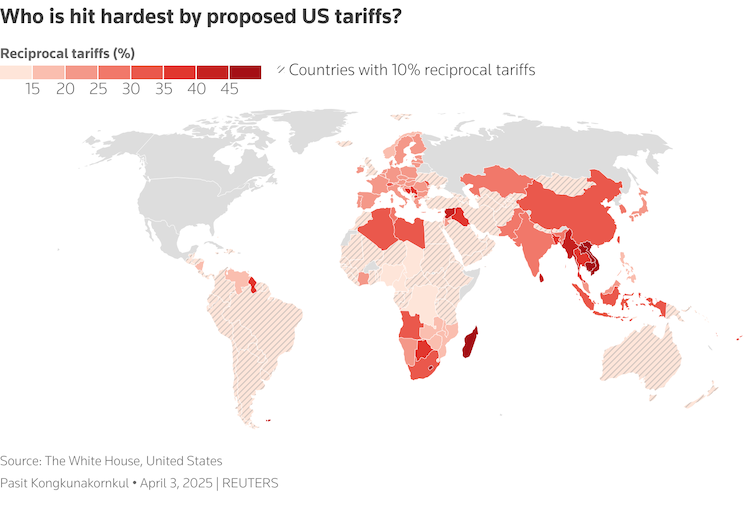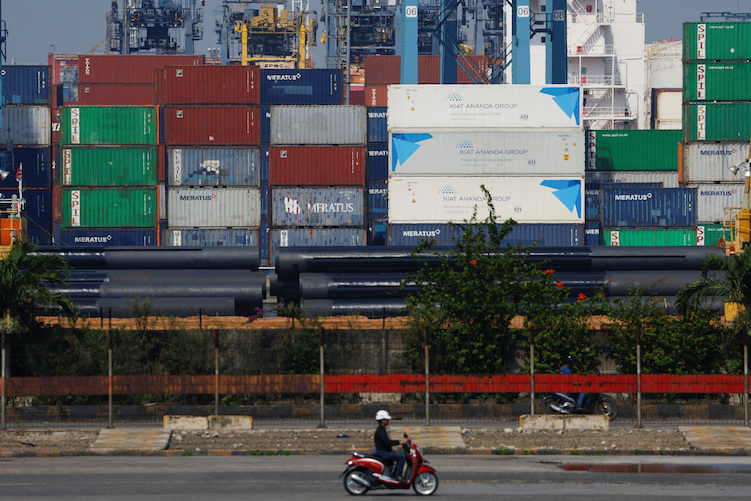China stood firm on Tuesday against US President Donald Trump’s threats to intensify his tariff war, saying it would not bow to “bullying” and “blackmail.”
Beijing dug in its heels – and continued to prop up its markets – after Trump threatened to ramp up tariffs on Chinese exports if China matched the 34% reciprocal tariffs he imposed last week.
And with the European Union also proposing counter-tariffs and US business leaders urging caution and a focus on trade deals, stocks on Asian markets steadied somewhat on Tuesday.
ALSO SEE: Trump Tariff ‘Medicine’ Triggers Asian Markets Bloodbath
The EU has discussed retaliatory counter-levies to match Trump’s tariff onslaught, which covered dozens of countries and sent financial markets into a tailspin, fuelling fears that the global economy may be headed for recession.
Stock markets seemed to find a firmer footing on Tuesday (April 8), although the mood was described as ‘fragile’.
Nikkei rises, but Indonesian stocks slump
Investors in Japan were able to recover some of their losses after a gut-wrenching few days, with the Nikkei up 6% after news that Treasury Secretary Scott Bessent would head to Tokyo for trade talks, following a call between Japanese PM Shigeru Ishiba and Trump on Monday.
Chinese blue chips climbed 1%, recouping a fraction of the more than 7% slide on April 7. Hong Kong’s Hang Seng Index jumped 2% after suffering the worst day since 1997 as a result of what the trading hub’s leader called “ruthless” tariffs.
Indonesia’s markets were slammed, however, with stocks shedding 9% and the rupiah ploughing a record low as trading resumed on April 8 after an extended holiday. Its central bank pledged to intervene, joining efforts by other global authorities to stem the rout in recent days.
Meanwhile, US Secretary of State Marco Rubio also spoke to his Pakistani counterpart about tariffs and future trade relations.
US stock futures also pointed higher after a roller-coaster session in which it touched its lowest level in more than a year.
Trump has said the US tariffs – a minimum of 10% for all US imports, with targeted rates of up to 50% – would help the United States recapture an industrial base that he says has withered over decades of trade liberalisation.
“It’s the only chance our country will have to reset the table. Because no other president would be willing to do what I’m doing, or to even go through it,” he told reporters at the White House.

EC also looking for long-term deal
The European Commission, meanwhile, proposed counter-tariffs of 25% on a range of US goods, including soya beans, nuts and sausages, though other potential items like bourbon whiskey were left off the list, according to a document seen by Reuters.
Officials said they stood ready to negotiate a “zero for zero” deal with the Trump Administration.
“Sooner or later, we will sit at the negotiation table with the US and find a mutually acceptable compromise,” EU trade commissioner Maros Sefcovic said at a news conference.
The 27-member bloc is struggling with tariffs on vehicles and metals already in place, and faces a 20% tariff on other products on April 9. Trump has also threatened to slap tariffs on EU alcoholic drinks.
Investors and political leaders have struggled to determine whether Trump’s tariffs are permanent or a pressure tactic to win concessions from other countries.
Bessent pushing for trade deals
US Treasury Secretary Scott Bessent met Trump in Florida on April 6, Politico reported, to urge him to emphasise striking trade deals with partners to reassure the markets that there is an endgame to the US strategy.
Administration officials say dozens of other countries have reached out with the hope of heading off the tariffs due to take effect on April 9.
Trump administration officials say the President is following through on a promise to reverse decades of trade liberalisation that he believes has undercut the US economy.
“He’s doubling down on something that he knows works, and he’s going to continue to do that,” White House economist Kevin Hassett said on Fox News.
“But he is also going to listen to our trading partners, and if they come to us with really great deals that advantage American manufacturing and American farmers, I’m sure he’ll listen.”
Warnings from US business leaders
Wall Street leaders issued warnings on US tariffs, with JPMorgan Chase chief executive Jamie Dimon saying they could have lasting negative consequences, while fund manager Bill Ackman said they could lead to an “economic nuclear winter”.
Ackman is one of a handful of Trump supporters who questioned the strategy. Billionaire Elon Musk, who is leading Mr Trump’s effort to slash government spending, called for zero tariffs between the US and Europe over the weekend.
Musk has also appealed directly to Mr Trump to reverse the tariffs, the Washington Post reported.
On April 7, Trump trade adviser Peter Navarro dismissed the Tesla chief executive as a “car assembler”.
Investors are now betting that the growing risk of recession could prompt the US Federal Reserve to cut rates as early as May.
Trump has repeated his call for the central bank to lower rates on April 7, but Fed chief Jerome Powell has so far indicated he is in no rush.
- Reuters with additional editing by Jim Pollard
NOTE: Minor edits were made and a link added in the top this report on April 8, 2025.
ALSO SEE:
China Hits Back With 34% Tariffs on US Goods; SE Asia Reeling
TikTok Still Up And Running in US After Tariffs Thwart Deal
Video Gamers Angry About Impacts of Trump Tariffs – LT
Asian Economies Rocked by Trump’s Tariffs, Fears of Trade War
India Likely to Defy Auto Lobby, Cut EV Levies to Appease Trump
India Shares Sink on US Tariffs Criticism, Xi Urges Trade ‘Tango’
China, Japan, South Korea Boost Trade Ties, as US Tariffs Loom
Carmakers Shares Tumble After Trump Announces 25% Auto Tariff
Xi Calls on Foreign CEOs to Help Protect Supply Chains
























